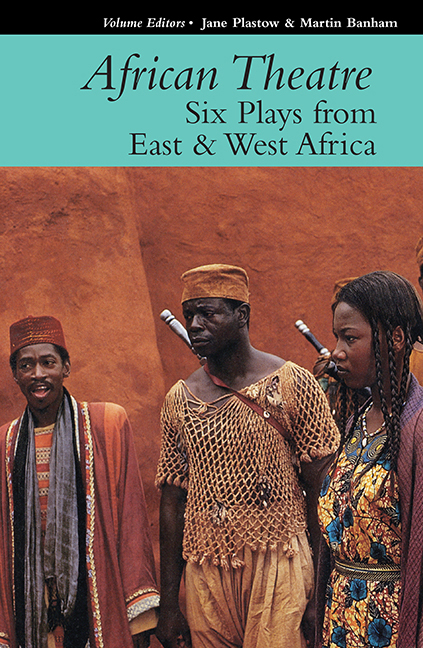Book contents
- Frontmatter
- Contents
- Notes on Contributors
- Obituary: Adieu Alain Ricard
- Preface
- THREE PLAYS FROM EAST AFRICA
- THREE PLAYS FROM WEST AFRICA
- If: A Tragedy of the Ruled
- Ola Rotimi: creating theatrical spaces
- Morountodun
- Morountodun: a retrospective commentary
- The Legend of Wagadu as Seen by Sia Yatabere
- Moussa Diagana & The Legend of Wagadu as Seen by Sia Yatabere: Advocating anarchy in Mauritania?
- Book Reviews
Ola Rotimi: creating theatrical spaces
from THREE PLAYS FROM WEST AFRICA
Published online by Cambridge University Press: 24 August 2019
- Frontmatter
- Contents
- Notes on Contributors
- Obituary: Adieu Alain Ricard
- Preface
- THREE PLAYS FROM EAST AFRICA
- THREE PLAYS FROM WEST AFRICA
- If: A Tragedy of the Ruled
- Ola Rotimi: creating theatrical spaces
- Morountodun
- Morountodun: a retrospective commentary
- The Legend of Wagadu as Seen by Sia Yatabere
- Moussa Diagana & The Legend of Wagadu as Seen by Sia Yatabere: Advocating anarchy in Mauritania?
- Book Reviews
Summary
Ola Rotimi (1938–2000) lived somewhat in the shadow of his fellow Nigerian dramatist Wole Soyinka but, while Soyinka commands international respect and admiration, Rotimi's reputation in Nigeria, both as a playwright and director, is unsurpassed. His fellow Nigerian dramatist Femi Osofisan has said that Rotimi ‘has no equal on the Nigerian stage when it comes to the control of physical space or the manipulation of audience response … Rotimi is lord of the arena stage, and his link with the audience is immediate, tactile and sensual’ (Osofisan, 1986).
Born of Yoruba and Ijo parents (a significant cross-community parentage in terms of Rotimi's committed stance against the destructive elements of tribalism), his father was an engineer and trade unionist. It is surely significant that both parents were heavily involved in amateur dramatics. Rotimi's father regularly directed shows, while his mother for a time ran a women's dance troupe and promoted drama in the Ijo language. Rotimi was educated at the prestigious Methodist Boys High School in Lagos and then in the United States at Boston University and Yale, specializing in playwriting. His first play, To Stir the God of Iron, was performed in Boston in 1963, with his much more famous and frequently produced socialist prowomen and anti-politician comedy, Our Husband Has Gone Mad Again, premiering at Yale in 1966 and winning an award as Yale Major Play of the Year. While studying in the US, Rotimi married his British wife Hazel May Guadreau who was also at Boston University, studying music.
Rotimi returned to Nigeria in 1966 to teach at the then University of Ife (now Obafemi Awolowo University) where he founded the Ori Olokun Players, basing their activities in a disused hotel. The simple hotel had the traditional Yoruba open courtyard, surrounded on three sides by single story buildings. Rotimi and his colleagues converted this into a performance arena, with the playing space on a shallow platform in the courtyard and the audience sitting around it, as shown in the illustration overleaf. Rotimi's early plays, The Gods Are Not to Blame (1968), Kurunmi (1969) and Ovonramwen Nogbaisi (1971) were premiered in this space.
- Type
- Chapter
- Information
- African Theatre 16: Six Plays from East & West Africa , pp. 193 - 198Publisher: Boydell & BrewerPrint publication year: 2017

